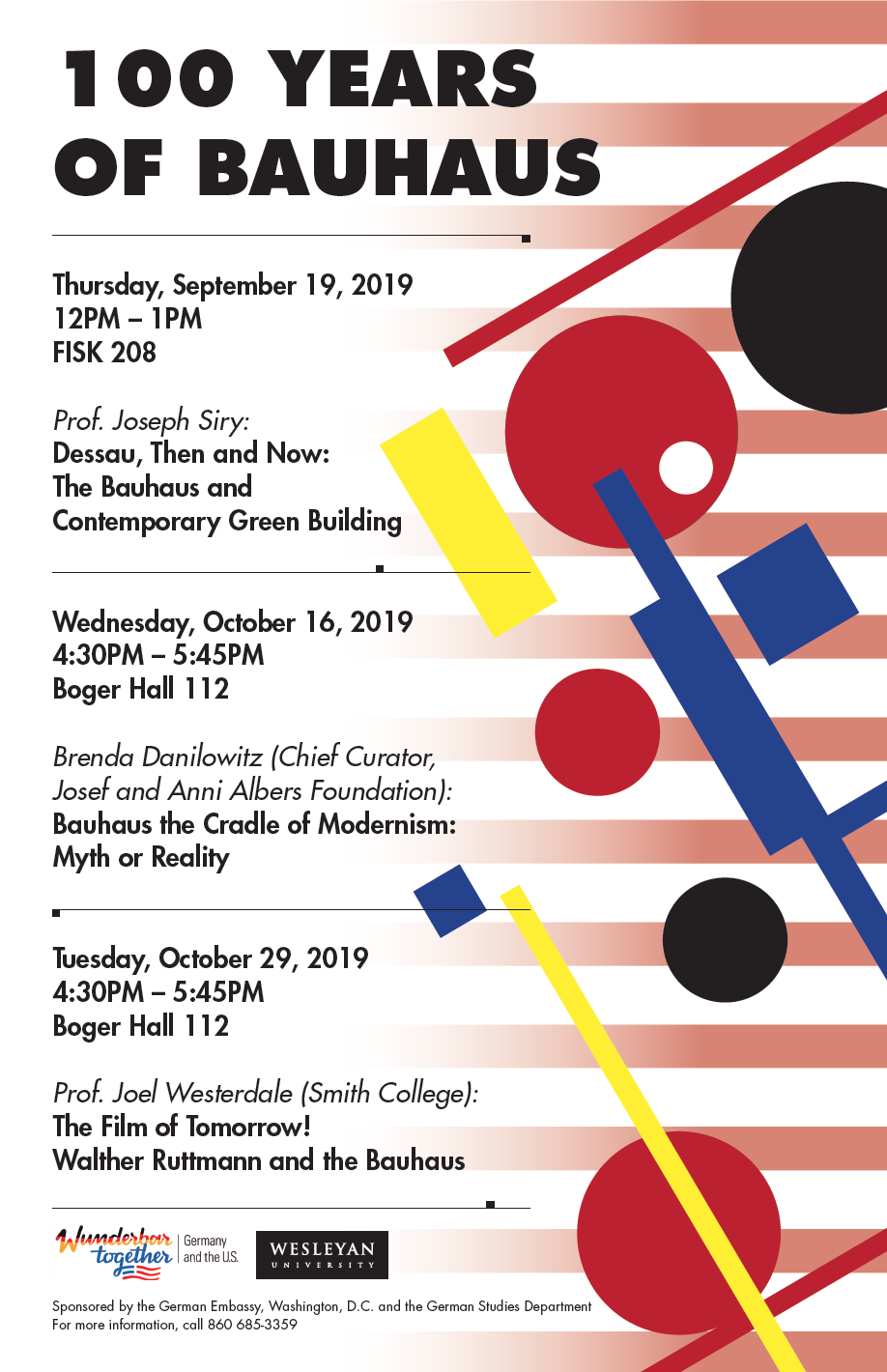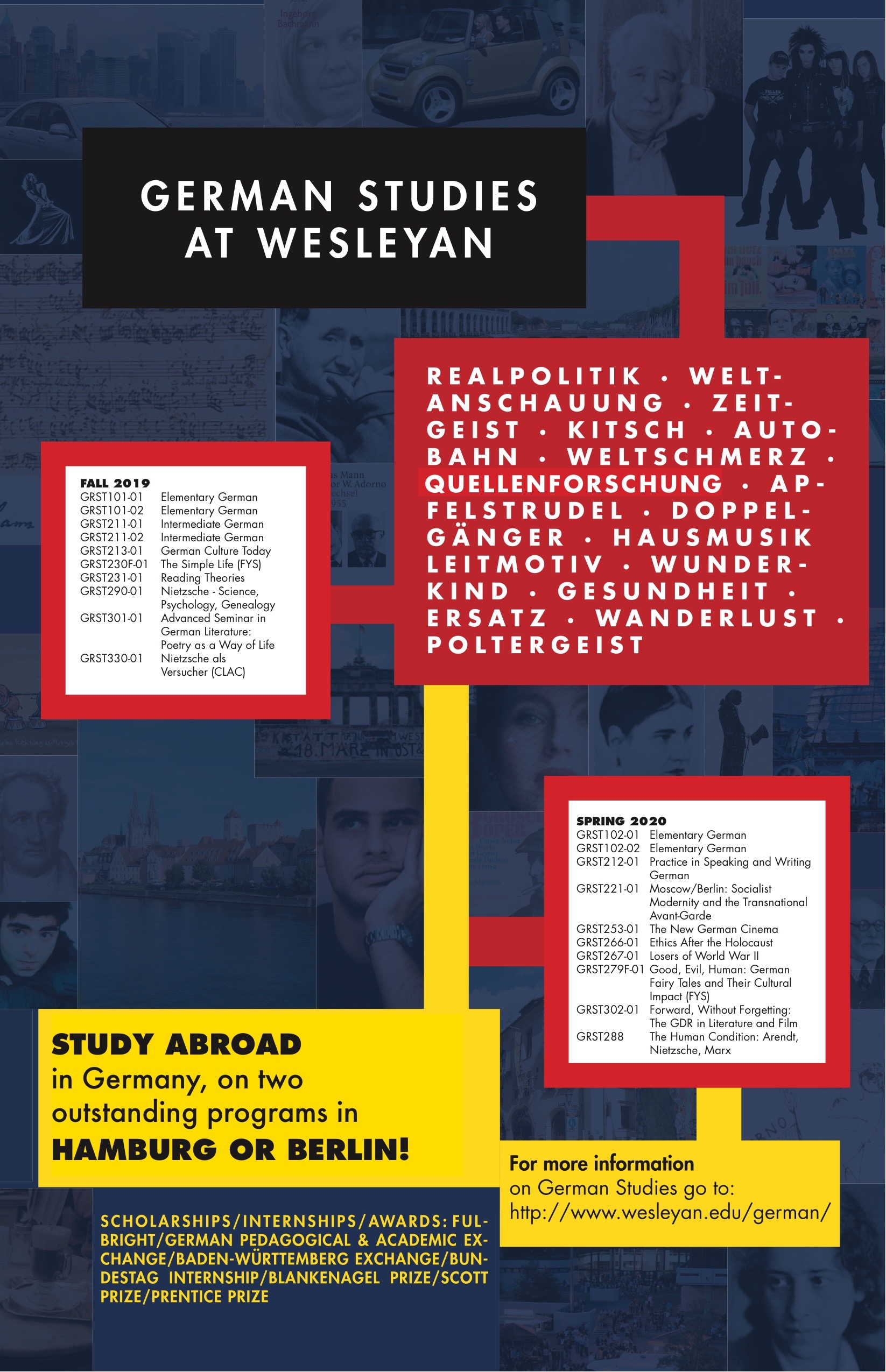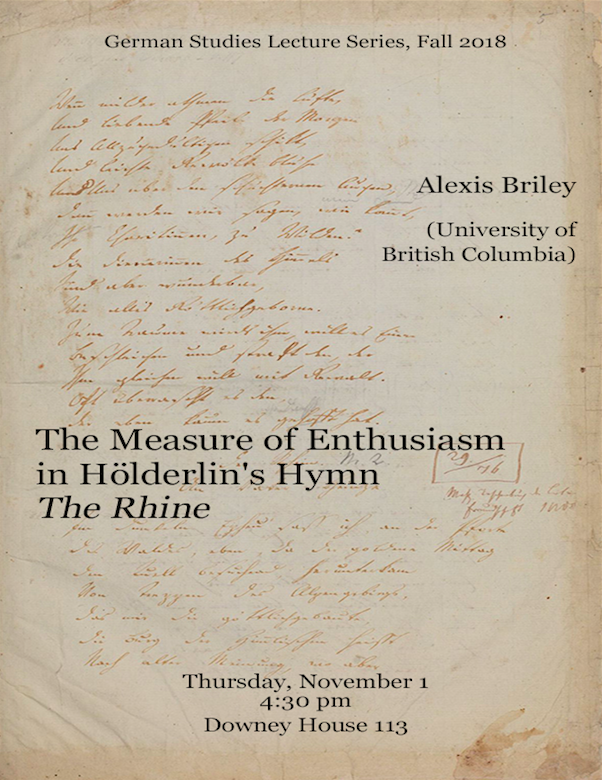
Events
Deutscher Mittagstisch
Join Katharina and friends for lunch

GERMAN MOVIE NIGHT

Starting October 3, 2019, the German Haus will show a German film every Thursday.
For more information, please contact Katarina Bueschler.
German Studies 2019/20
In addition, we offer this fall a tutorial that is cross-listed with ARHA for .25 credits on the Bauhaus. For more information, click on 100 Years Bauhaus: Discover and Experience the Making of Modern.
Sissi- A German Musical
 Familiar with Sissi, the Bavarian princess who later became Empress Elisabeth of Austria? You might have been familiar with the classical figure, cast by Romy Schneider. However, the sweet royal fairy tale is neither the true nor the whole story…Come to Boger 112 around 7 pm, October 13th and enjoy a German Musical. The screening is hosted by German Haus!
Familiar with Sissi, the Bavarian princess who later became Empress Elisabeth of Austria? You might have been familiar with the classical figure, cast by Romy Schneider. However, the sweet royal fairy tale is neither the true nor the whole story…Come to Boger 112 around 7 pm, October 13th and enjoy a German Musical. The screening is hosted by German Haus!
Elisabeth is a German-language musical commissioned by the Vereinigte Bühnen Wien (VBW), with book/lyrics by Michael Kunze and music by Sylvester Levay. It portrays the legendary life and death of Empress Elisabeth of Austria.
This is a German musical, but English subtitle will be provided. So don’t worry whether your German is proficient enough. There will be an intermission between Act I and Act II. Refreshments will be served. The audience is welcomed and encouraged to bring friends who might also be interested.
Please contact Binxin Wang if you have any questions.
Second German Studies Colloquium
Lizzie Whitney (GRST/COL ’19) will lead a discussion (in German) on two pieces from Wladimir Kaminer’s Russendisko alongside a brief chapter from Hegel’s Aesthetik on “Der subjektive Humor.” I have attached the texts to this mail. Please feel free to distribute this invitation to other German speakers on campus.
Tuesday, March 6, from 4:30 to 5:30 p.m., in Boger Hall 113
German Symposium-Meaningful Presence: Lived Experience (Erlebnis) and Representation
 Thursday, February 15
Thursday, February 15
5:00-7:00 p.m. at Russell House, 350 High Street
Keynote Lecture by David Wellbery (University of Chicago): “’Dies Bildnis ist bezaubernd schön.’ Image as Dramatic Motivation”
Moderator: Martin Bäumel (Department of German Studies, Wesleyan University)
Friday, February 16
The following events will take place at the Center for the Humanities, 95 Pearl Street, Room 106
9:30 a.m.-1:10 p.m. Epistemologies
9:30-11:10 a.m. Conceptualizing Presence; Moderator: Daniel Smyth (College of Letters, Wesleyan University)
9:30-10:20 a.m. Aleksandra Prica (Department of Germanic & Slavic Languages and Literatures, University of North Carolina, Chapel Hill): “Signatura rerum. On Presence and Method”
10:20-11:10 a.m. Ethan Kleinberg (Center for the Humanities, Wesleyan University): “The Sourcery of the Text: Chladenius and the Historico-Theological Presence of the Past”
11:10-11:30 a.m. Coffee Break
11:30 a.m. – 1:10 p.m. Knowing Oneself, Knowing the World
Moderator: Julia Goesser Assaiante (Department of German Studies, Trinity College)
11:30 a.m.-12:20 p.m. Michael Meere (Department of Romance Languages & Literatures, Wesleyan University): “Imagining the Self, Inventing the Other: Representation and Presence in Montaigne’s Essays and Travel Journal”
12:20-1:10 p.m. Kirk Wetters (Department of Germanic Languages and Literatures, Yale University): “Presence and Absence in Georg Forster’s Voyage Round the World”
1:10-2:30 p.m. Lunch Break
2:30-7:00 p.m. Technologies
2:30-4:10 p.m. The Presence of the Ephemeral; Moderator: Ulrich Plass (Department of German Studies, Wesleyan University)
2:30-3:20 p.m. Marco Aresu (Department of Romance Languages & Literatures, Wesleyan University): “Aurality and Corpus in Medieval Italian Literature”
3:20-4:10 p.m. Gabriel Trop (Department of Germanic & Slavic Languages and Literatures, University of North Carolina, Chapel Hill): “The Aesthetics of the Paradox”
4:10-4:20 p.m. Coffee Break
4:20-7:00 pm Presence Techniques; Moderator: Stephanie Weiner (Department of English, Wesleyan University)
4:20-5:10 p.m. Jocelyn Holland (Department of Germanic & Slavic Studies, University of California, Santa Barbara): “Die Kunst des Fügens: Materials, Techniques, Schemas”
5:10-6:00 p.m. Courtney Weiss Smith (Department of English, Wesleyan University): “The Echo Historians: Prosody and Natural History in Eighteenth-Century England.”
6:00-6:10 p.m. Break
6:10-7:00 p.m. Natasha Korda (Department of English, Wesleyan University): “Gyno Ludens: Puppenhäuser and the Gendered Phenomenology of Play”
Saturday, February 17
9:30 a.m.-3:20 p.m. Sociability
10:20 a.m.-12:20 p.m. Aesthetics and Ethics; Moderator: Roger Mathew Grant (Department of Music, Wesleyan University)
10:20-11:10 a.m. Frauke Berndt (Deutsches Seminar, Universität Zürich): “A.G. Baumgarten’s Epic Voice”
11:10-11:30 a.m. Coffee Break
11:30-12:20 Dorothea von Mücke (Department of Germanic Languages, Columbia University): “The Presence of the Poet and The Enlightenment’s Author Function”
12:20-1:40 Lunch Break
1:40-3:20 p.m. Visualizing Social Cohesion; Moderator: Natasha Korda (Department of English, Wesleyan University)
1:40 -2:30 p.m. Michael Armstrong (Department of Romance Languages & Literatures, Wesleyan University): “Master Mistresses on the 17th-Century Spanish and English Stage: Actresses, Boy Actors, and the Proto-History of Screwball Comedy”
2:30-3:20 p.m. Joel Lande (Department of German, Princeton University): “Goethe’s Many”
3:20-3:45 p.m. Closing Remarks
Organized by the Department of German Studies and the Center for the Humanities, with generous support from the DAAD (German Academic Exchange Service), the Thomas and Catharine McMahon Memorial Fund, the College of Letters, the Center for the Study of Public Life, and Academic Affairs.











